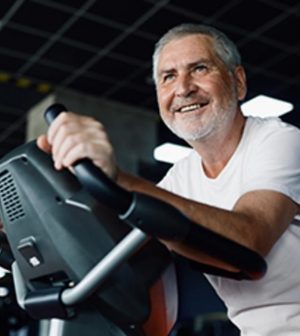- Could Your Grocery Store Meat Be Causing Recurring UTIs?
- Are You Making This Expensive Thermostat Error This Winter?
- Recognizing the Signs of Hypothyroidism
- 10 Strategies to Overcome Insomnia
- Could Artificial Sweeteners Be Aging the Brain Faster?
- Techniques for Soothing Your Nervous System
- Does the Water in Your House Smell Funny? Here’s Why
- Can a Daily Dose of Apple Cider Vinegar Actually Aid Weight Loss?
- 6 Health Beverages That Can Actually Spike Your Blood Sugar
- Treatment Options for Social Anxiety Disorder
Exercise May Boost Tumor-Fighting Immune Cells in Cancer Patients

Cancer patients have a lot to think about, but adding one more thing — lacing up their sneakers — may pay off.
Two new studies suggest engaging in light or moderate exercise increases the number of cancer-destroying immune cells.
At the same time, exercise reduces the side effects of cancer treatments, improves quality of life, improves prognosis and decreases cancer risk, said the Scandinavian researchers.
“It was previously thought that cancer patients should just rest after a cancer diagnosis. Today, we have more and more researched information that exercise can even improve the prognosis of cancer. However, it is not yet fully known how exercise controls cancer,” explained co-author Tiia Koivula, from the University of Turku in Finland.
Past preclinical studies found exercise affected the functioning of the immune system, leading to more immune cells going to the tumor site and becoming more active in destroying cancer cells. This new research looked at the impact of a short bout of exercise.
Researchers found that only 10 minutes of exercise was enough to have an impact.
Exercising harder was even better, with more immune cells transferred to the bloodstream.
“Although our results indicate that the higher the exercise intensity is, the more immune cells are transferred from their storage organs into the bloodstream, it is notable that also light or moderate intensity exercise lasting for only 10 minutes will cause an increase in the number of immune cells which are important for fighting cancer,” Koivula said in a university news release.
Study participants were 28 recently diagnosed lymphoma and breast cancer patients. Those with lymphoma were ages 20 to 69, while the breast cancer patients were 37 to 73.
Patients exercised for 10 minutes on a bicycle. Researchers drew blood samples prior to exercise and again twice after exercise.
“The pedaling resistance was determined individually for each patient so that it corresponded to light or moderate physical activity. The most important goal was that the patients were able to pedal for 10 minutes straight without exhaustion, but so that their heart rate increased,” Koivula said.
The researchers analyzed white blood cells, comparing the samples before and after exercise. They found an increased number of immune cells capable of destroying cancer cells.
For the lymphoma patients, researchers found that cytotoxic T cells and natural killer cells increased in the bloodstream.
These also increased in the breast cancer patients, who additionally saw an increase in white blood cells and the number of intermediate monocytes and B cells.
In the blood samples taken 30 minutes after exercise, the number of immune cells returned to a level corresponding to the resting value for most patients.
“It is especially interesting that we saw an increase in cytotoxic immune cells during the exercise in both patient groups. These immune cells are capable of destroying cancer cells,” Koivula said.
It’s not yet clear where the immune cells go once in the bloodstream, and more research is needed to further scientists’ understanding of the process.
For now, Koivula recommends that cancer patients find a type of exercise they enjoy.
“Cancer treatments can make you tired and lower your motivation for exercise, which is why it is comforting to know that just 10 minutes of cycling or walking to a supermarket, for example, can be enough to boost the body’s immune system,” she said.
The studies were published recently in the journals Frontiers in Physiology – Clinical and Translational Physiology and Scientific Reports.
More information
The American Cancer Society has more on physical activity and cancer.
SOURCE: University of Turku, news release, May 2, 2023
Source: HealthDay
Copyright © 2026 HealthDay. All rights reserved.










